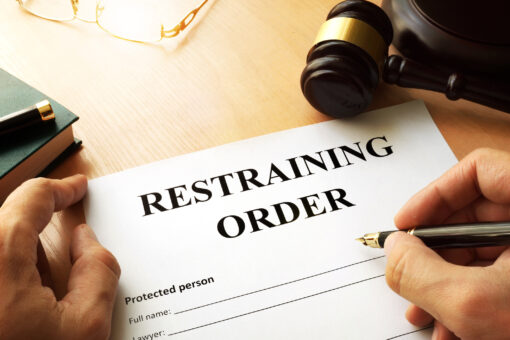Domestic violence restraining orders are legal tools designed to protect individuals from abuse or harassment within a domestic setting. These orders are not restricted to romantic relationships; they can apply to anyone sharing a living space, including family members or roommates.
The implications of having a restraining order issued against you are significant, as violating these orders can lead to serious legal consequences. If you have been accused of or arrested for domestic violence, contact Chambers Law Firm at 714-760-4088 for a free legal consultation.
Criteria for Filing a Restraining Order
Restraining orders in the context of domestic violence can only be filed by specific parties. These include spouses, domestic partners, former partners, or anyone living with the petitioner. Additionally, children over the age of 11 can independently file a restraining order, or have someone file on their behalf. This broadens the scope beyond typical romantic relationships, encompassing various domestic situations.
Procedure for Filing a Restraining Order
The process of filing a restraining order begins with the petitioner – the person seeking protection – filing a declaration detailing the alleged abuse or harassment. This declaration must be signed under penalty of perjury.
The burden of proof in these cases is relatively low compared to criminal trials. The petitioner must demonstrate a ‘preponderance of evidence’, meaning it’s more likely than not that the alleged abuse or harassment occurred. This evidentiary standard is crucial for understanding both the filing and defending against a restraining order.
Types of Evidence Used in Restraining Order Cases
A variety of evidence can be used to support a domestic violence restraining order. This includes, but is not limited to, text messages, voicemails, police reports, witness testimonies, evidence of past conduct, and medical records. Such evidence plays a pivotal role in establishing the necessity of the restraining order and the credibility of the petitioner’s claims.
Responding to a Restraining Order
If a restraining order is filed against you, immediate action is advised. Contacting a criminal defense attorney, even in the absence of criminal charges, is a critical step. Legal guidance is essential for navigating the complexities of restraining order cases and for formulating an effective response strategy. An attorney can provide valuable insights into the legal process, help interpret the evidence against you, and represent your interests in court.
Understanding the nuances of domestic violence restraining orders is crucial for anyone involved in such cases. From the criteria for filing to the types of evidence used and the appropriate response strategies, being well-informed and legally prepared is essential. Seeking experienced legal representation is a critical step in effectively managing the challenges posed by a domestic violence restraining order. Contact Chambers Law Firm at 714-760-4088 to learn more.





